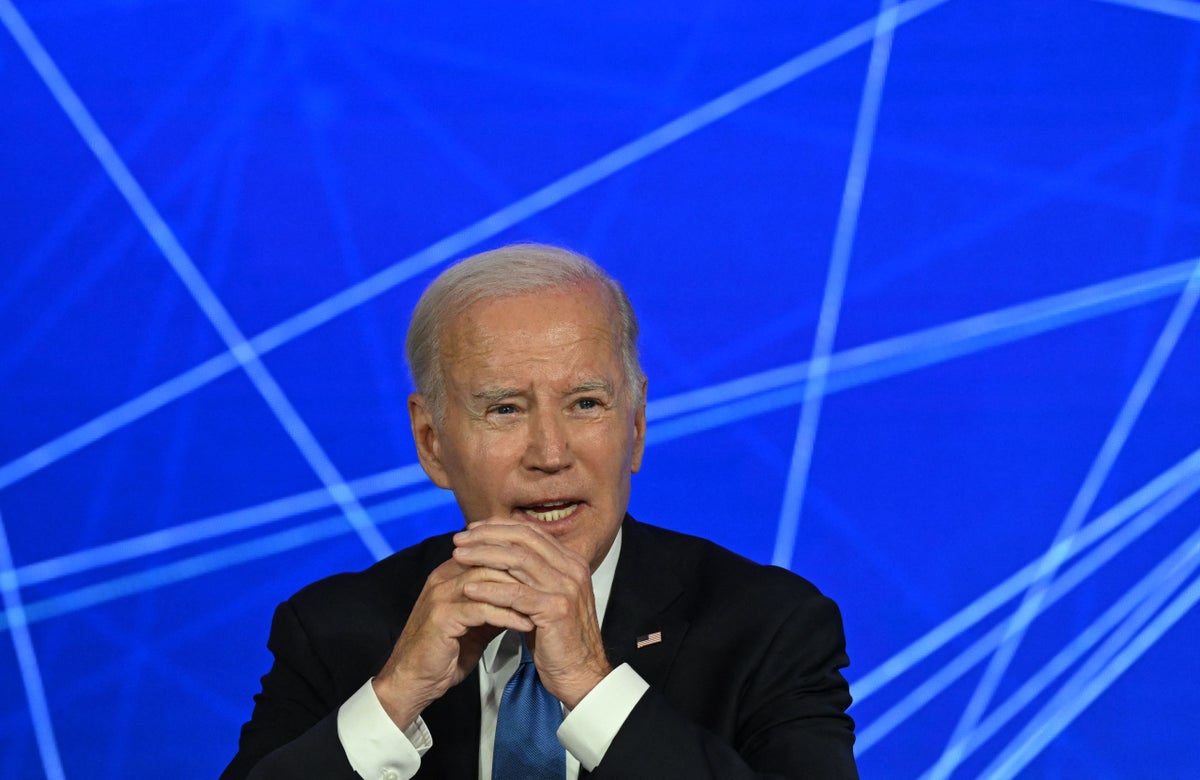
President Biden has said his comment calling Xi Jinping a “dictator” has not harmed the US-China relationship.
Mr Biden labelled Xi Jinping a “dictator” during a political fundraiser in California, a comment that did not go down well with Beijing.
Chinese officials responded sharply to the remarks, saying they were “extremely absurd and irresponsible” on Wednesday.
On Thursday 22 June, Mr Biden told reporters that he still expects to meet with Mr Xi.
“I don’t think it’s had any real consequence,” Mr Biden said in a press conference with Indian Prime Minister Narendra Modi.
Mr Biden labelled Mr Xi a “dictator” during a political fundraiser in California, a comment that did not go down well with Beijing.
Chinese officials responded sharply to the remarks, saying they were “extremely absurd and irresponsible” on Wednesday.
The US president’s criticism of Mr Xi came after US secretary of state Antony Blinken visited Beijing to stabilise bilateral relations, that China said was at its lowest point since formal ties were established.
The comments from Mr Biden, clearly aimed at a domestic audience, highlight the struggles both nations have in trying to keep their rivalry from spiralling towards conflict – while also trying to take a hard line on .
Mr Biden also said Mr Xi was very embarrassed when a suspected Chinese spy balloon was blown off course over the US airspace early this year, making the remark about the Chinese leader despite Mr Blinken saying on Monday when the "chapter" should be closed.
"The reason why Xi Jinping got very upset in terms of when I shot that balloon down with two box cars full of spy equipment in it was he didn’t know it was there," Mr Biden said.
"That’s a great embarrassment for dictators. When they didn’t know what happened. That wasn’t supposed to be going where it was. It was blown off course," Mr Biden added.
Mr Biden also said China "has real economic difficulties". Beijing, seeking to revive a flagging economy in the wake of Covid-19 has repeatedly hit out at US sanctions on its companies and officials. The US has also sought to block Beijing's access to cutting-edge computer chip manufacturing technology that could be used for military purposes, and accused China of stealing American intellectual property.
Mr Blinken and Mr Xi agreed in their meeting to work towards stabilising the intense rivalry between Washington and Beijing, but failed to produce a major breakthrough during the secretary of state’s visit to China – the first by America’s top diplomat in nearly five years.
Mr Biden praised Mr Blinken’s work in attempting to repair the relationship between the two countries, adding that it would take time. Mr Biden told the fundraiser that US climate envoy John Kerry may go to China “pretty soon”.
Mr Biden said he thought relations between the two countries were on the right path, and he indicated that progress was made during Mr Blinken’s trip – the first such visit by the US secretary of state in the last five years.
While it marked a return to high-level contacts between the sides, China continues to refuse talks between their militaries. In recent days, the US said Chinese warplanes and naval ships have manoeuvred in threatening ways to their American counterparts in the Taiwan Strait and South China Sea, despite agreements between them on protocols for avoiding such incidents.
China also reiterated its strong objections to US support for the self-governing island democracy of Taiwan, which Beijing claims as its own territory.
“We’re not going to have success on every issue between us on any given day, but in a whole variety of areas, on the terms that we set for this trip, we have made progress and we are moving forward,” Mr Blinken said in Beijing on Monday.
But he acknowledged entrenched differences. "We have no illusions about the challenges of managing this relationship," he said.
"There are many issues on which we profoundly, even vehemently, disagree."
A day later, Mr Biden said that Mr Xi had been concerned by the so-called Quad strategic security group, which includes Japan, Australia, India and the United States. The US president said he previously told the Chinese counterpart that the US was not trying to encircle China with the Quad.
"He called me and told me not to do that because it was putting him in a bind," Mr Biden said. “We’re just trying to make sure the international rules of air and sea lanes remain open.”
Later this week, Mr Biden will meet Indian prime minister Narendra Modi and China is expected to be a topic of discussion between the two leaders.
Additional reporting from the Associated Press







